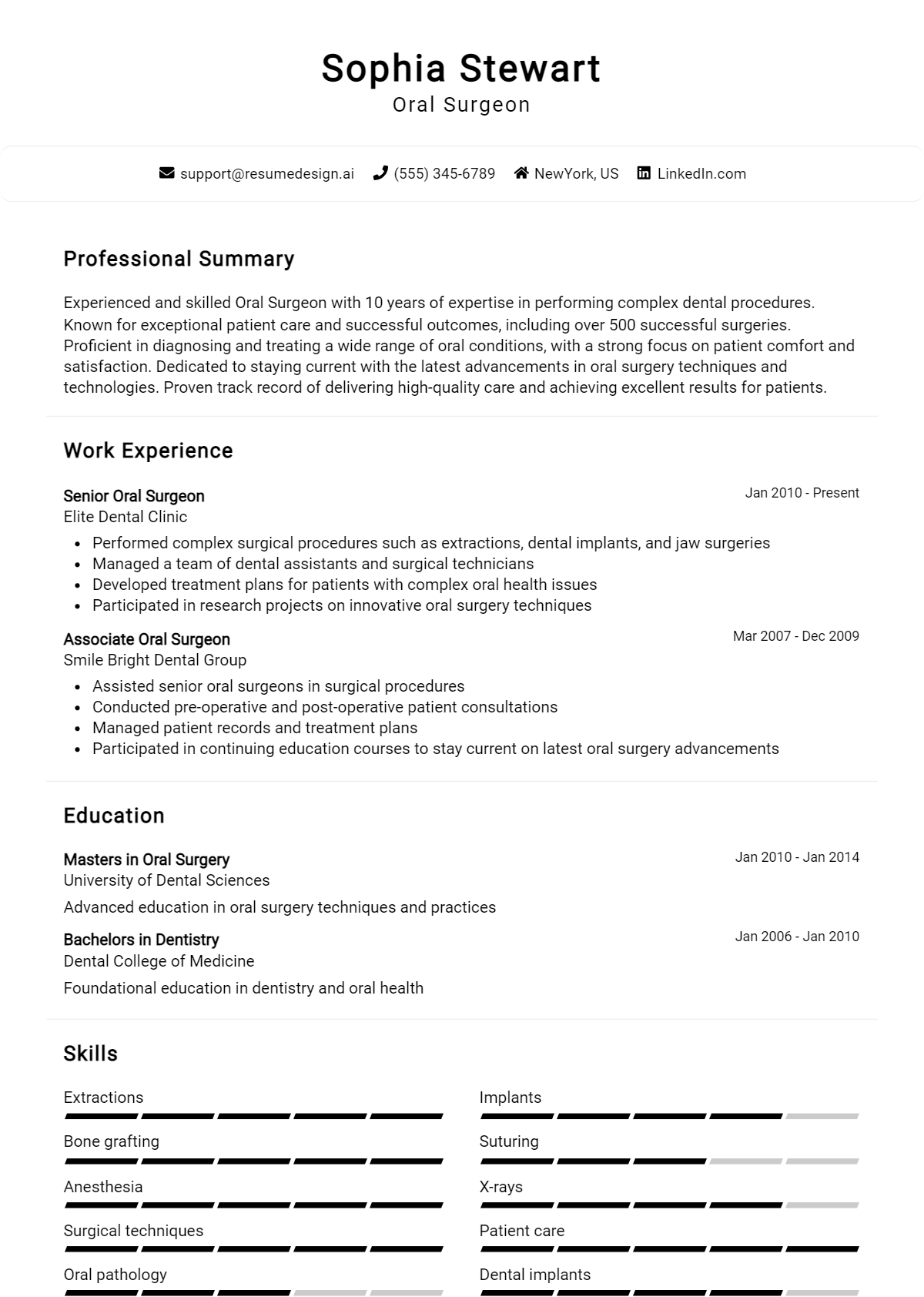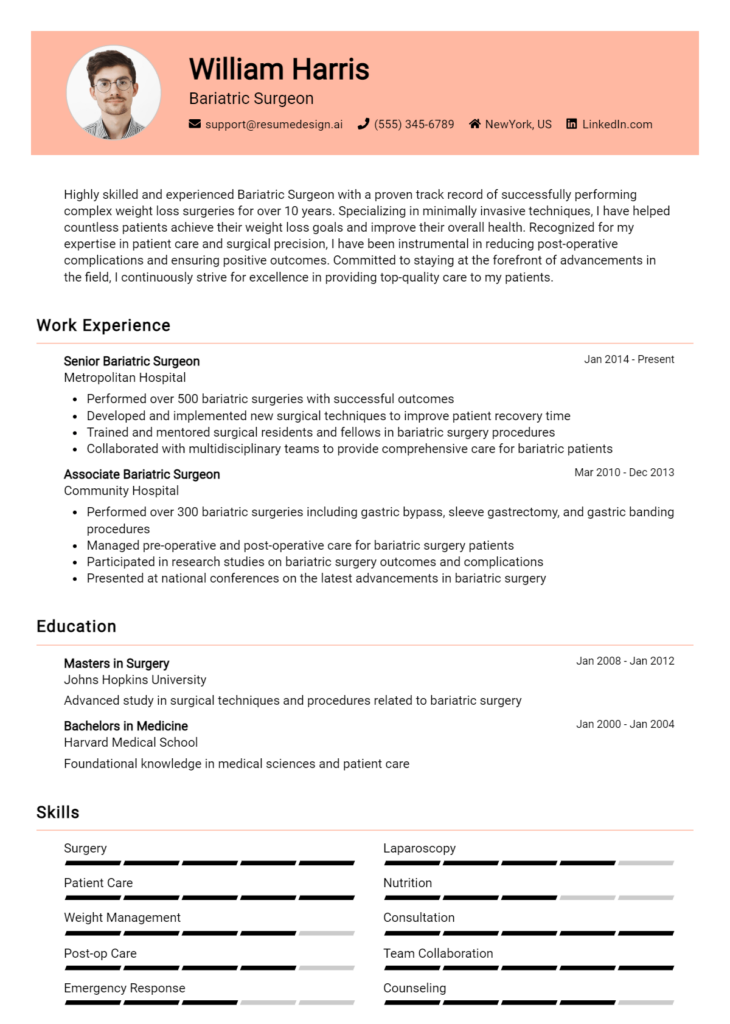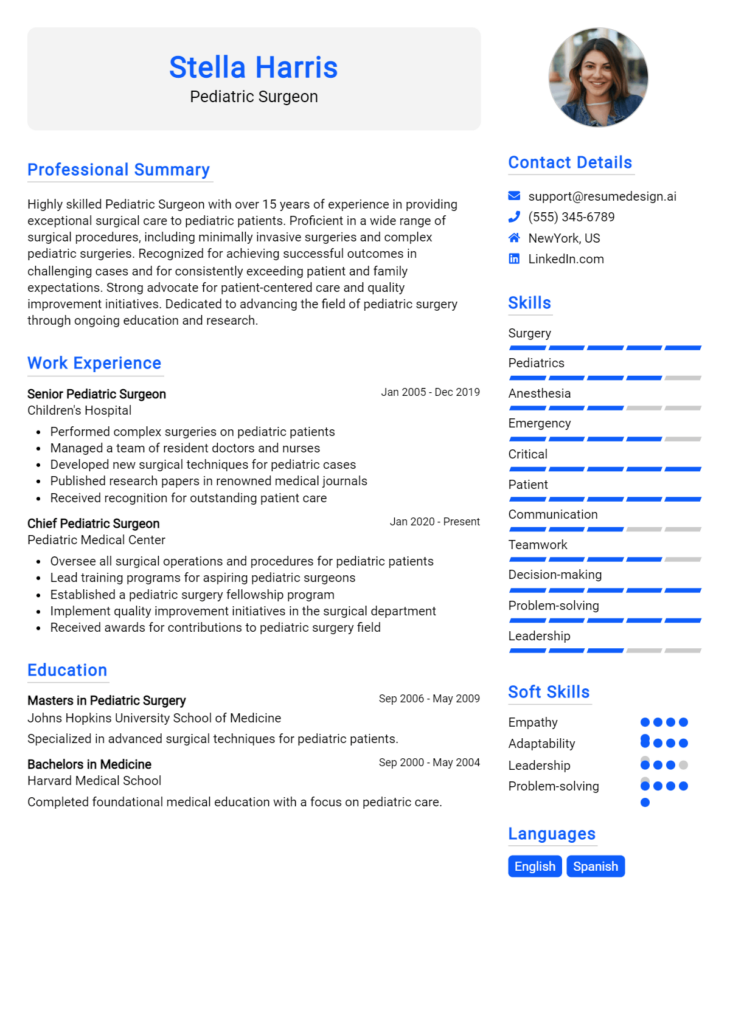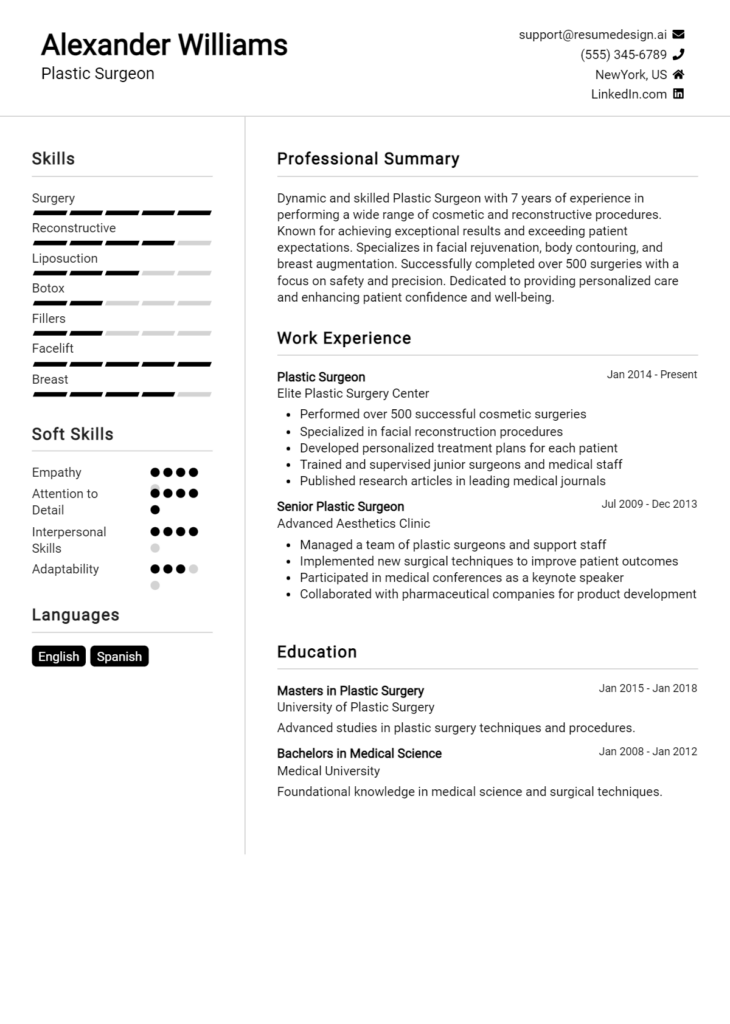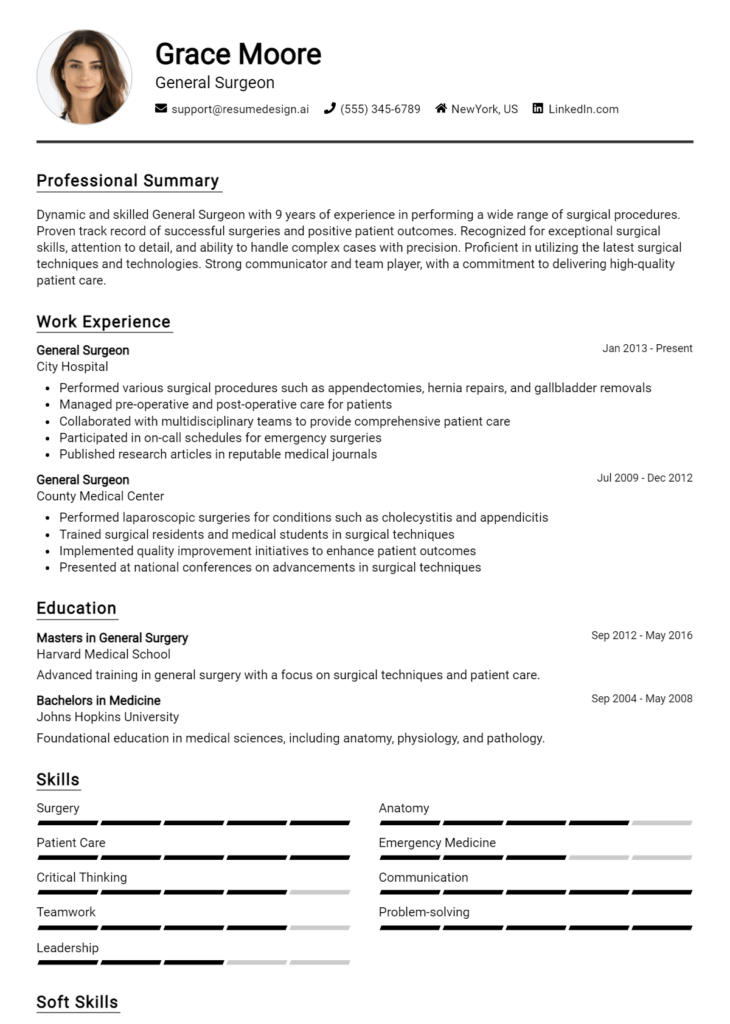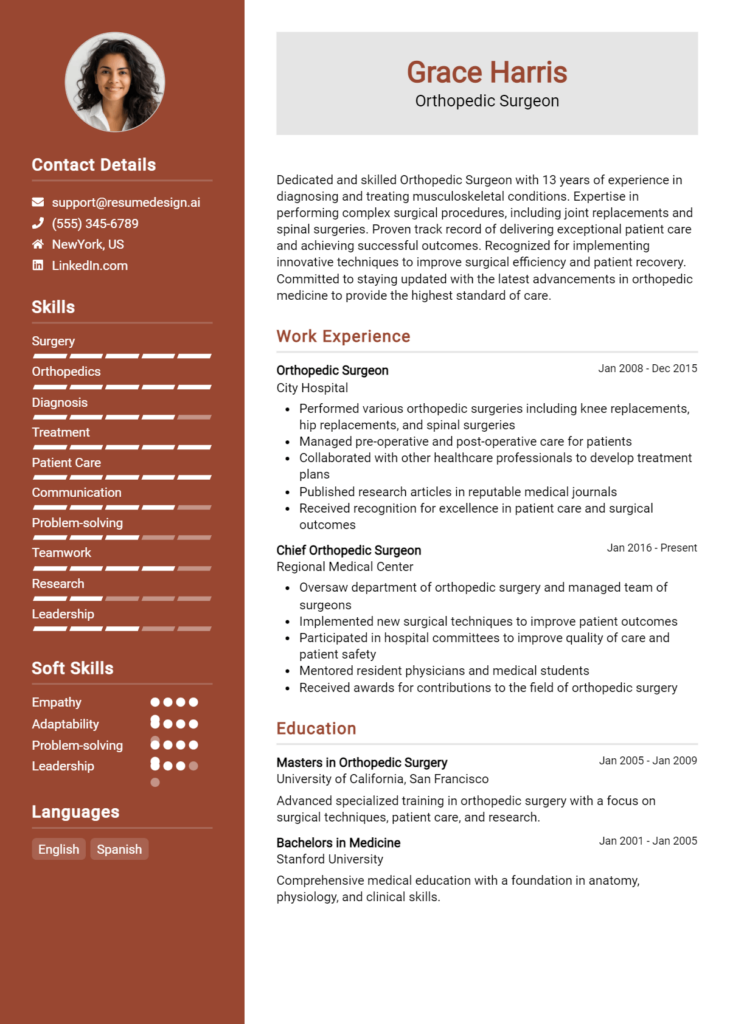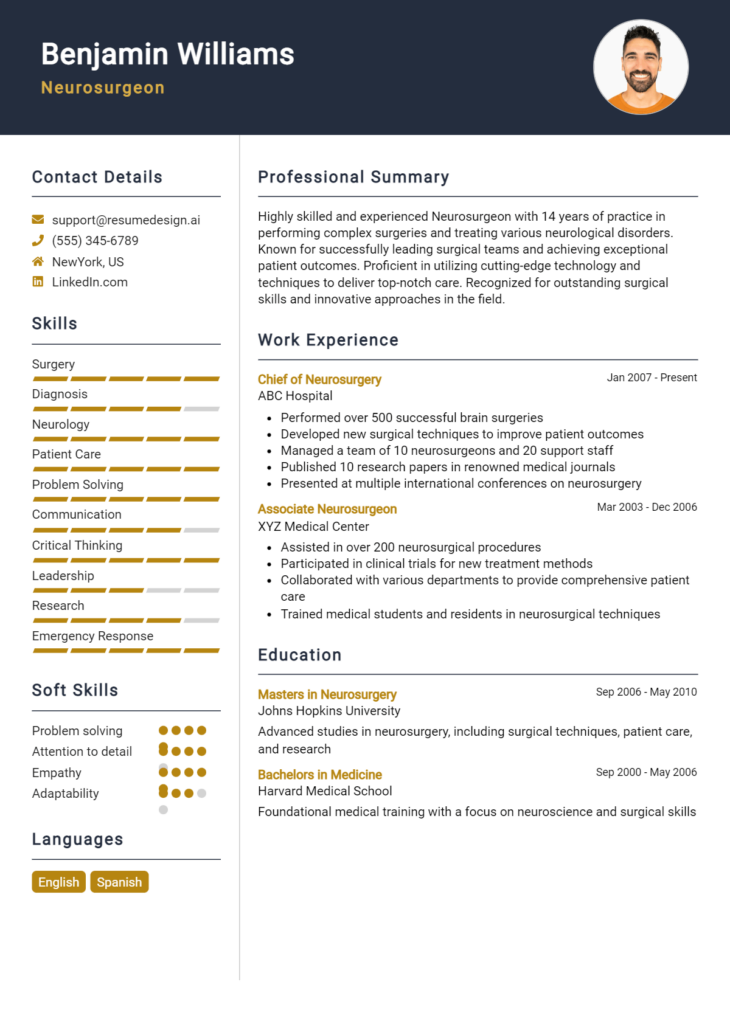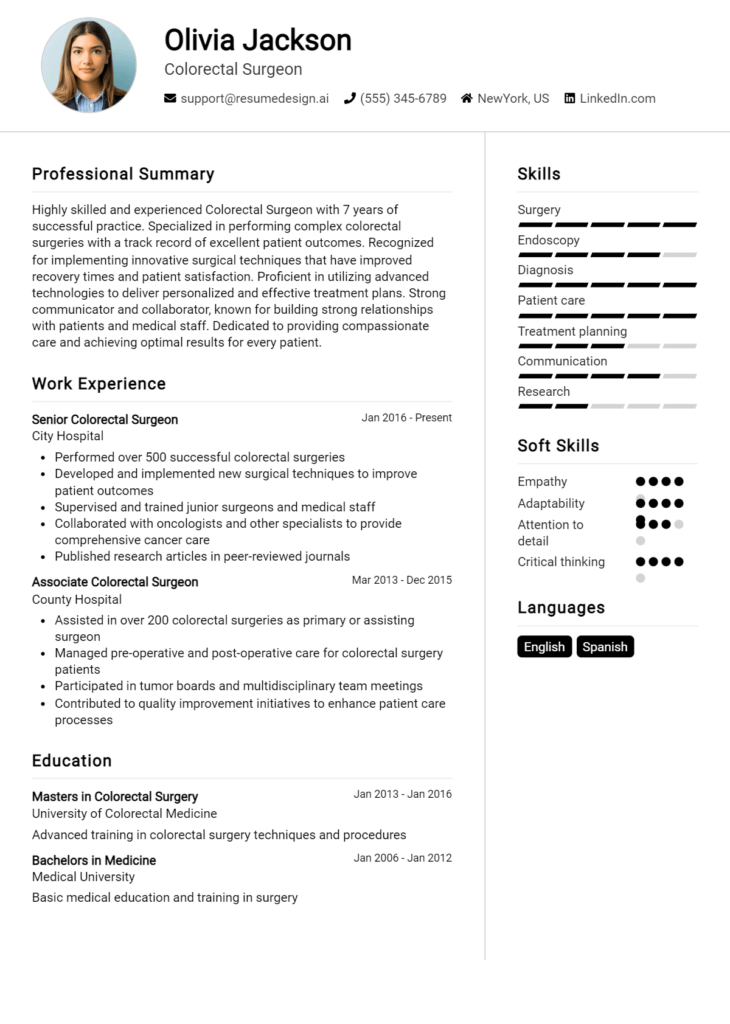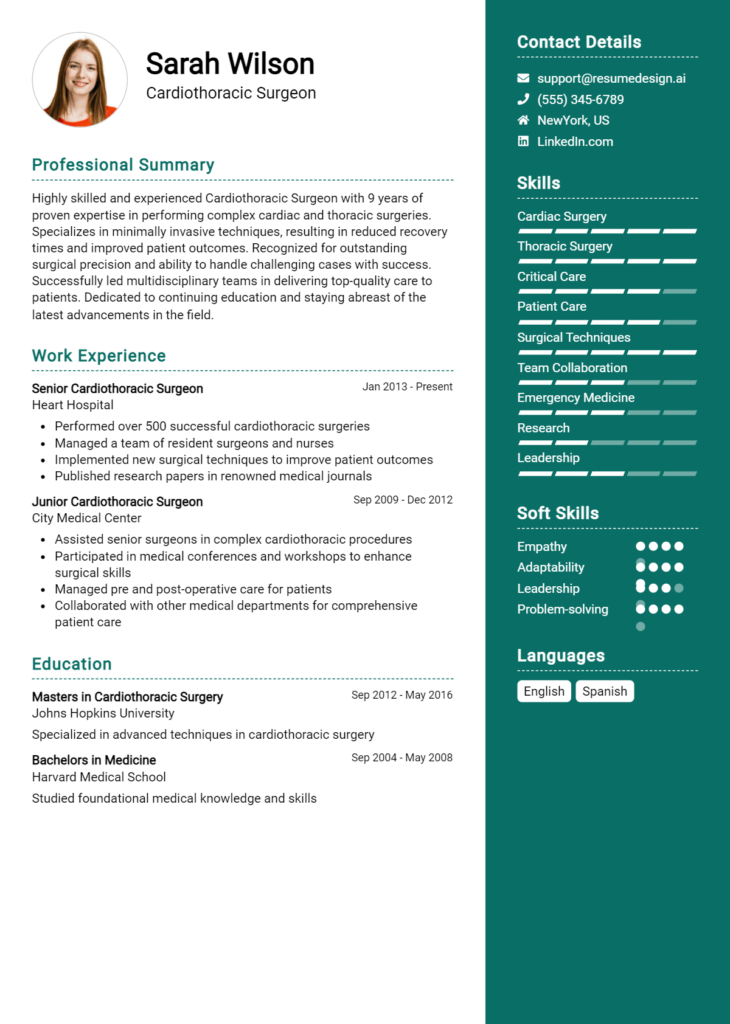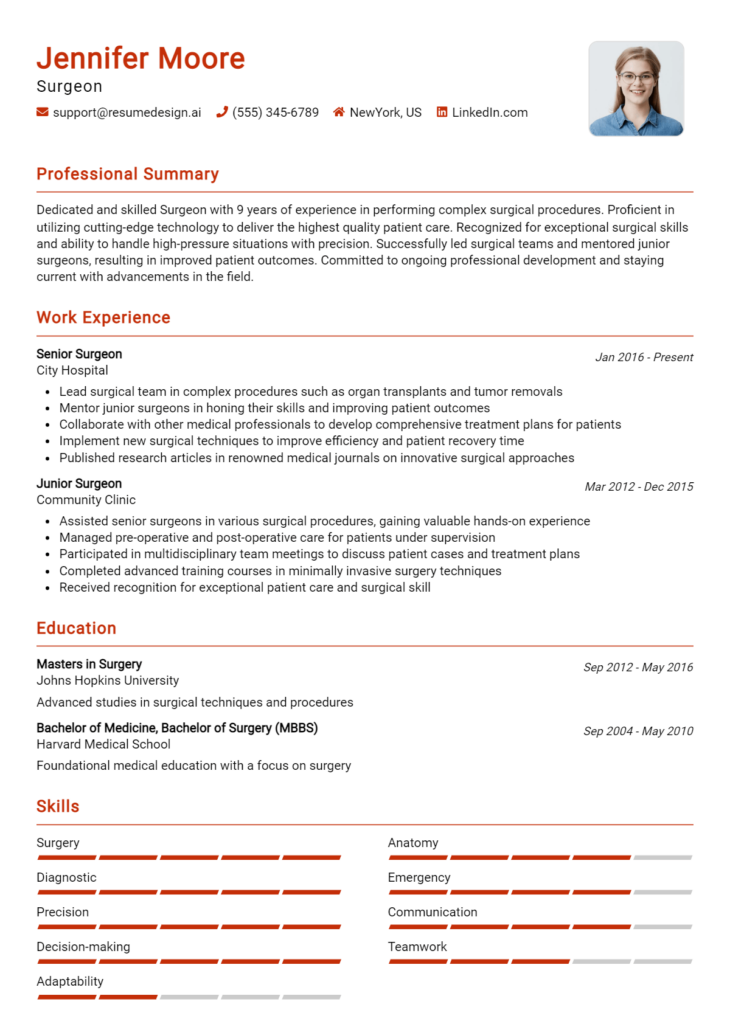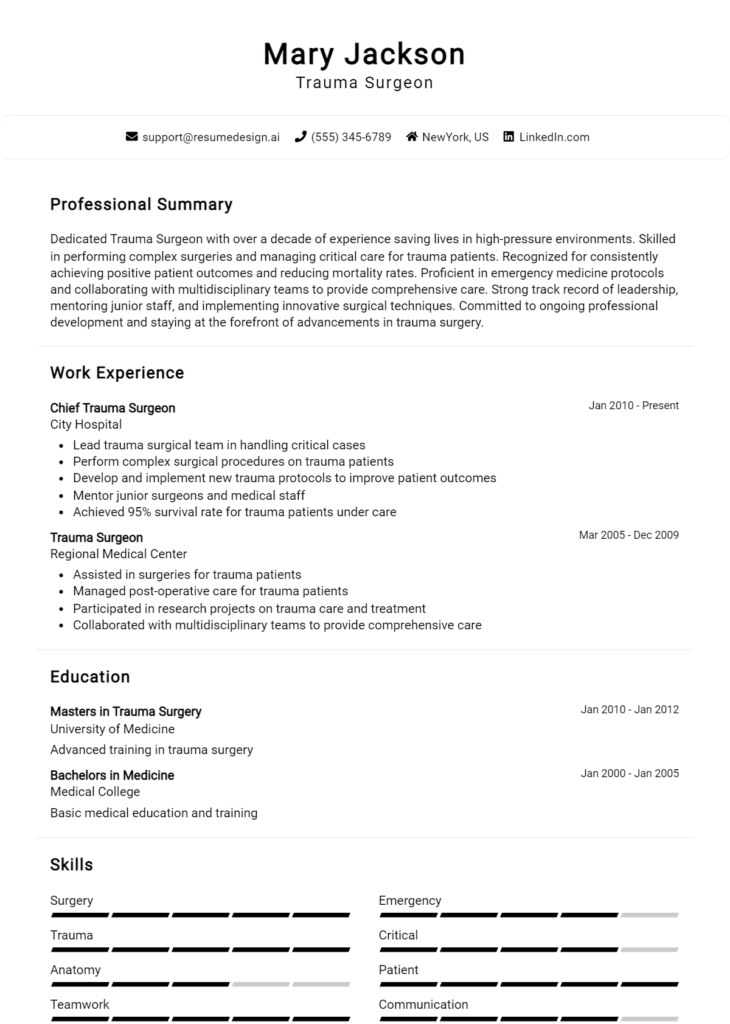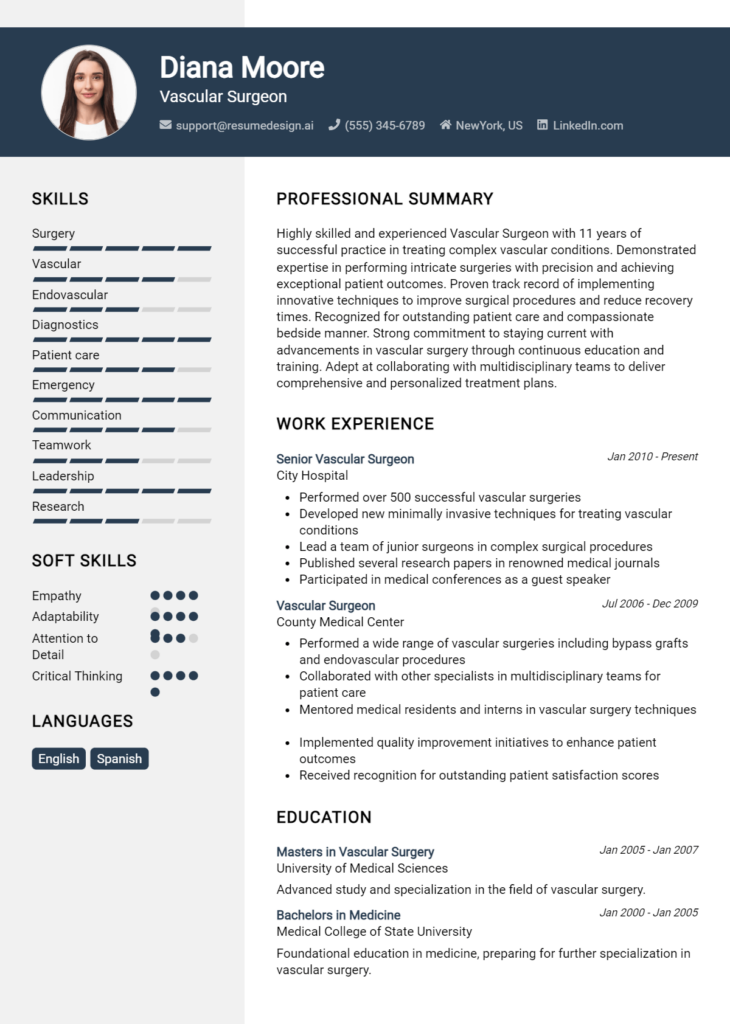Oral Surgeon Core Responsibilities
An Oral Surgeon plays a crucial role in dental and medical care, performing surgical procedures to treat conditions of the mouth, teeth, and face. Key responsibilities include diagnosing oral diseases, conducting surgeries such as tooth extractions and jaw realignments, and collaborating with dental specialists and physicians to ensure comprehensive patient care. Essential skills include technical proficiency, strong problem-solving abilities, and operational efficiency. These competencies are vital in meeting organizational goals, and a well-structured resume effectively highlights these qualifications, showcasing the surgeon's expertise and commitment to patient health.
Common Responsibilities Listed on Oral Surgeon Resume
- Perform surgical procedures on the oral and maxillofacial regions.
- Diagnose and develop treatment plans for oral diseases and conditions.
- Collaborate with dental teams and other medical professionals.
- Manage patient care before, during, and after surgery.
- Utilize advanced imaging technologies for accurate diagnostics.
- Educate patients on post-operative care and recovery.
- Conduct research to improve surgical techniques and patient outcomes.
- Maintain accurate patient records and documentation.
- Handle emergency cases requiring immediate surgical intervention.
- Stay updated on advancements in oral surgery practices.
High-Level Resume Tips for Oral Surgeon Professionals
In the competitive field of oral surgery, a well-crafted resume serves as a vital tool that can make or break your chances of landing your dream job. As the first impression you make on potential employers, your resume must not only highlight your technical skills and clinical experience but also reflect your achievements and dedication to patient care. A well-structured resume showcases your qualifications in a way that resonates with hiring managers, setting you apart from other candidates. This guide aims to provide practical and actionable resume tips specifically tailored for Oral Surgeon professionals, ensuring that your application stands out in a crowded marketplace.
Top Resume Tips for Oral Surgeon Professionals
- Tailor your resume to the specific job description by incorporating relevant keywords and phrases.
- Begin with a strong summary statement that captures your expertise and career goals in oral surgery.
- Highlight your educational background, including dental school and any specialized training or residencies.
- Showcase relevant experience with detailed descriptions of your roles, responsibilities, and accomplishments.
- Quantify your achievements where possible, such as the number of successful surgeries performed or patient satisfaction rates.
- Include industry-specific skills such as proficiency in advanced surgical techniques, sedation methods, and patient management.
- Emphasize any certifications or licensure relevant to oral surgery and related specialties.
- Incorporate professional affiliations and memberships in dental and oral surgery organizations.
- Keep the format clean and professional, ensuring readability with consistent fonts and bullet points.
- Proofread meticulously to avoid any errors that could undermine your professionalism.
By implementing these tips, you can significantly enhance your resume, increasing your chances of landing a job in the oral surgery field. A targeted and polished resume not only showcases your qualifications effectively but also demonstrates your commitment to excellence, making a compelling case to potential employers about why you are the right candidate for their practice.
Why Resume Headlines & Titles are Important for Oral Surgeon
In the competitive field of oral surgery, a well-crafted resume headline or title serves as a critical first impression. This concise statement can immediately capture the attention of hiring managers, providing a snapshot of a candidate's key qualifications and unique value proposition. A strong headline should be relevant to the position being applied for and summarize the applicant's skills or achievements in an impactful way. By doing so, it encourages the reader to delve deeper into the resume, making it an essential component for any oral surgeon looking to stand out in a crowded job market.
Best Practices for Crafting Resume Headlines for Oral Surgeon
- Keep it concise: Aim for one impactful sentence or phrase.
- Be role-specific: Tailor the headline to reflect the oral surgeon position.
- Highlight key qualifications: Incorporate skills, certifications, or years of experience.
- Use impactful language: Choose strong action verbs and descriptive adjectives.
- Focus on results: Mention any significant achievements or contributions.
- Avoid jargon: Use clear language that is easily understood by non-specialists.
- Make it unique: Differentiate yourself from other candidates with your headline.
- Revise for clarity: Ensure the headline conveys your main selling point effectively.
Example Resume Headlines for Oral Surgeon
Strong Resume Headlines
"Board-Certified Oral Surgeon with 10 Years of Experience in Complex Surgical Procedures"
“Dedicated Oral Surgeon Specializing in Minimally Invasive Techniques and Patient Care Excellence”
“Results-Driven Oral Surgeon with Proven Track Record of Successful Surgical Outcomes”
Weak Resume Headlines
“Oral Surgeon Seeking Job”
“Experienced Medical Professional”
The strong headlines are effective because they are specific, showcasing the candidate's qualifications and unique strengths in a clear and concise way. They immediately communicate the value the candidate brings to the position. Conversely, the weak headlines fail to impress due to their vagueness and lack of relevant details, which do not provide any insights into the candidate’s qualifications or the value they can add to the practice. A compelling headline is essential for making a memorable first impression that can lead to further consideration in the hiring process.
Writing an Exceptional Oral Surgeon Resume Summary
Crafting an exceptional resume summary is crucial for an oral surgeon looking to stand out in a competitive job market. A well-written summary serves as a powerful introduction, quickly capturing the attention of hiring managers by highlighting key skills, relevant experience, and notable accomplishments. Given the specialized nature of oral surgery, it is essential that this summary is not only concise and impactful but also tailored specifically to the job being applied for. A strong summary sets the tone for the rest of the resume and can be the deciding factor in whether a candidate is invited for an interview.
Best Practices for Writing a Oral Surgeon Resume Summary
- Quantify achievements: Use numbers to highlight your impact, such as the number of successful surgeries performed or improvement in patient satisfaction scores.
- Focus on relevant skills: Emphasize specific skills related to oral surgery, such as proficiency in surgical techniques, patient care, and knowledge of anesthesia.
- Tailor the summary: Customize your summary for each job application by aligning it with the job description and required qualifications.
- Keep it concise: Aim for 3-5 sentences that succinctly showcase your qualifications without overwhelming the reader.
- Highlight unique selling points: Identify what sets you apart from other candidates, such as specialized training or unique experiences.
- Use powerful language: Employ strong action verbs and descriptive adjectives to convey competence and professionalism.
- Showcase teamwork and communication skills: Highlight your ability to work with interdisciplinary teams and communicate effectively with patients.
- Update regularly: Revise your summary to reflect your most recent experiences, skills, and accomplishments as you progress in your career.
Example Oral Surgeon Resume Summaries
Strong Resume Summaries
Detail-oriented oral surgeon with over 10 years of experience in complex surgical procedures, performing more than 1,500 successful surgeries with a 98% patient satisfaction score. Proven track record in collaborating with dental teams to improve patient outcomes and streamline surgical protocols.
Board-certified oral surgeon skilled in advanced surgical techniques and anesthesia management. Successfully reduced post-operative complications by 30% through the implementation of enhanced recovery protocols, leading to improved patient turnover and satisfaction rates.
Dynamic oral surgeon with extensive experience in maxillofacial surgery, having treated over 2,000 patients. Recognized for exceptional patient care and awarded 'Surgeon of the Year' for excellence in surgical outcomes and patient communication.
Weak Resume Summaries
Experienced oral surgeon looking for a new position. Has done many surgeries and worked in various hospitals.
Oral surgeon with a strong background in surgery and patient care. Seeking to apply skills in a new role.
The examples provided illustrate the difference between strong and weak resume summaries effectively. Strong summaries are specific, highlight quantifiable achievements, and convey direct relevance to the role of an oral surgeon. In contrast, weak summaries lack details, are overly generic, and fail to demonstrate the candidate's impact or unique qualifications, making them less compelling to hiring managers.
Education and Certifications Section for Oral Surgeon Resume
The education and certifications section of an Oral Surgeon resume is crucial in establishing a candidate's qualifications and expertise in the field. This section not only highlights the academic background and degrees achieved but also showcases industry-relevant certifications and specialized training that reflect the candidate’s commitment to continuous learning. By providing details on relevant coursework and advanced credentials, candidates can significantly enhance their credibility and demonstrate their alignment with the specific demands of the Oral Surgeon role, thereby increasing their chances of securing an interview and ultimately, the position.
Best Practices for Oral Surgeon Education and Certifications
- Include only relevant degrees, such as Doctor of Dental Surgery (DDS) or Doctor of Medicine in Dentistry (DMD).
- List any additional certifications, such as Board Certification in Oral and Maxillofacial Surgery.
- Highlight specialized training programs or fellowships that underscore advanced skills in oral surgery.
- Provide details on relevant coursework that complements your surgical expertise, such as anesthesia or pain management.
- Order your education and certifications chronologically, starting with the most recent qualifications.
- Use clear and concise language to describe each qualification, avoiding jargon that might confuse the reader.
- Include dates of completion to demonstrate the currency of your training and certifications.
- Consider adding any membership in professional organizations, such as the American Association of Oral and Maxillofacial Surgeons (AAOMS).
Example Education and Certifications for Oral Surgeon
Strong Examples
- Doctor of Dental Surgery (DDS), University of California, San Francisco, 2015
- Board Certified in Oral and Maxillofacial Surgery, American Board of Oral and Maxillofacial Surgery, 2018
- Fellowship in Oral and Maxillofacial Surgery, New York University, 2019
- Advanced Training in Anesthesia, American Dental Society of Anesthesiology, 2020
Weak Examples
- Bachelor of Arts in Biology, State University, 2010 (not directly relevant to surgery)
- Certification in Basic Life Support (BLS), 2015 (common and not specialized)
- Dental Assistant Certification, 2012 (not relevant for an Oral Surgeon role)
- High School Diploma, 2008 (too basic for an advanced role)
The strong examples listed are considered effective because they directly align with the qualifications required for an Oral Surgeon, showcasing relevant degrees and specialized training that enhance the candidate's expertise. In contrast, the weak examples fail to demonstrate the necessary qualifications for the role, either due to their irrelevance to oral surgery or their basic nature, which does not reflect the advanced education and training expected of a qualified Oral Surgeon.
Top Skills & Keywords for Oral Surgeon Resume
As an Oral Surgeon, having a well-crafted resume that highlights your skills is crucial to stand out in a competitive job market. The specific abilities and expertise you possess not only reflect your competency in performing complex surgical procedures but also demonstrate your capacity to provide exceptional patient care. Recruiters and hiring managers often prioritize skill sets that indicate both technical proficiency and interpersonal effectiveness. By showcasing a blend of hard and soft skills in your resume, you can effectively communicate your qualifications and readiness for the demands of this specialized role.
Top Hard & Soft Skills for Oral Surgeon
Soft Skills
- Excellent communication skills
- Empathy and compassion
- Strong attention to detail
- Team collaboration
- Problem-solving abilities
- Leadership qualities
- Time management
- Adaptability
- Patient education
- Stress management
Hard Skills
- Proficient in surgical techniques
- Experience with anesthesia administration
- Knowledge of dental radiology
- Expertise in diagnosis and treatment planning
- Familiarity with dental software applications
- Surgical instrumentation proficiency
- Ability to perform complex extractions
- Understanding of oral pathology
- Skills in implantology
- Knowledge of post-operative care protocols
By incorporating these skills into your resume, alongside your relevant work experience, you can create a compelling narrative that showcases your expertise and dedication to the field of oral surgery.
Stand Out with a Winning Oral Surgeon Cover Letter
Dear [Hiring Manager's Name],
I am writing to express my interest in the Oral Surgeon position at [Clinic/Hospital Name] as advertised on [where you found the job listing]. With a Doctor of Dental Surgery (DDS) degree and over [X years] of specialized experience in oral and maxillofacial surgery, I am excited about the opportunity to contribute my skills to your esteemed practice. My robust clinical training, combined with a commitment to providing exceptional patient care, positions me as a strong candidate for this role.
Throughout my career, I have successfully performed a wide range of surgical procedures, including wisdom tooth extractions, dental implants, and corrective jaw surgeries. My experience in managing complex cases has honed my ability to assess each patient's unique needs and develop tailored treatment plans. I am proud to have maintained a high patient satisfaction rate, which I attribute to my dedication to clear communication and compassionate care. I am also well-versed in collaborating with multidisciplinary teams to ensure comprehensive and effective treatment for my patients.
At [Previous Employer/Practice Name], I implemented innovative techniques that reduced recovery times and improved surgical outcomes. I continually seek opportunities for professional development, attending workshops and conferences to stay updated on the latest advancements in oral surgery. I am particularly drawn to [Clinic/Hospital Name] because of its commitment to [specific value or initiative related to the practice], and I am eager to be part of a team that shares my passion for excellence in patient care.
Thank you for considering my application. I am looking forward to the opportunity to discuss how my expertise and dedication can contribute to the continued success of [Clinic/Hospital Name]. I am excited about the possibility of working together to provide exceptional oral surgical care to our community.
Sincerely,
[Your Name]
[Your Contact Information]
[LinkedIn Profile or Website, if applicable]
Common Mistakes to Avoid in a Oral Surgeon Resume
When crafting a resume for an oral surgeon position, it's essential to present a polished and professional document that highlights your skills, experience, and qualifications. However, many candidates make common mistakes that can detract from their candidacy. Avoiding these pitfalls can significantly enhance your chances of landing an interview. Here are some frequent errors to steer clear of when creating your oral surgeon resume:
Ignoring Tailoring: Failing to customize your resume for the specific job can make you seem less interested. Tailoring your resume to highlight relevant experiences and skills for the position can make a strong impression.
Overloading with Jargon: While technical terms are important in the medical field, using too much jargon can confuse the reader. Strive for a balance that maintains professionalism while being accessible.
Neglecting Soft Skills: Oral surgeons must possess not only technical skills but also strong interpersonal abilities. Omitting skills such as communication and empathy can leave your resume lacking.
Using an Unprofessional Format: A cluttered or overly complex resume format can detract from the content. Stick to a clean, organized layout that is easy to read and visually appealing.
Inadequate Detail on Experience: Simply listing job responsibilities without elaborating on achievements or outcomes can weaken your resume. Use quantifiable results to demonstrate your impact in previous roles.
Failing to Showcase Continuing Education: The field of dentistry is constantly evolving. Not highlighting any additional training, certifications, or continuing education can make you appear stagnant in your professional development.
Omitting Relevant Publications or Research: If you have contributed to research or have publications, leaving them out can be a missed opportunity to showcase your expertise and commitment to the field.
Listing Irrelevant Work Experience: Including unrelated jobs can dilute the strength of your resume. Focus on experiences that directly relate to oral surgery and omit positions that do not contribute to your candidacy.
By avoiding these common mistakes, you can create a more effective resume that better showcases your qualifications and sets you apart in a competitive job market.
Conclusion
As an Oral Surgeon, your expertise in surgical procedures, patient care, and complex dental issues is vital to ensuring optimal oral health. The article has highlighted several key aspects of this specialized role, including the importance of advanced training, staying updated with the latest techniques, and effective communication with patients and other healthcare professionals.
Moreover, we discussed the significance of developing a strong professional resume that reflects your skills, experience, and accomplishments. A well-crafted resume is crucial in showcasing your qualifications to potential employers and setting you apart in a competitive job market.
To enhance your job application materials, we encourage you to take advantage of the various resources available. Whether you need inspiration or a complete overhaul of your documents, tools such as resume templates, resume builder, resume examples, and cover letter templates can help you create a polished and professional presentation of your credentials.
Now is the time to review your Oral Surgeon resume and ensure it highlights your unique qualifications effectively. Don’t miss out on the opportunity to impress future employers with a standout application—get started today!

